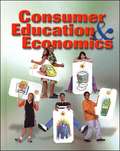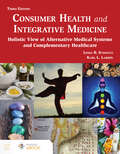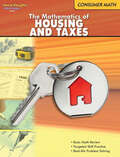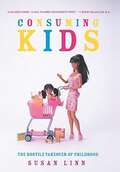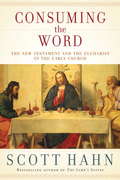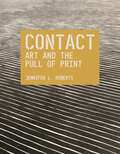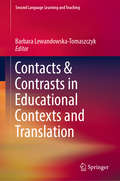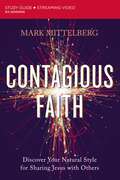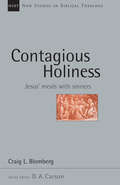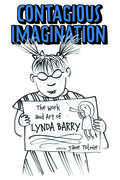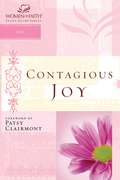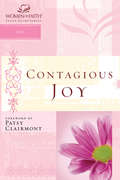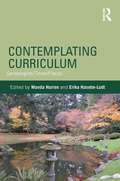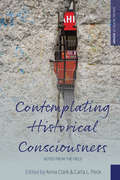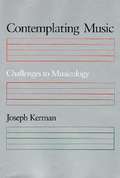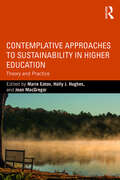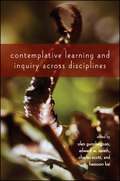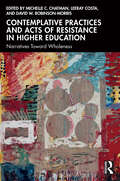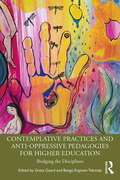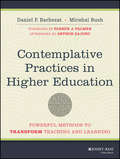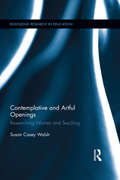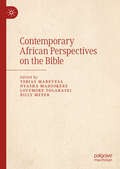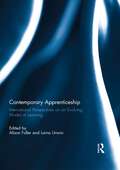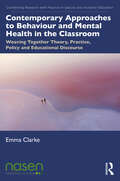- Table View
- List View
Consumer Education & Economics (5th edition)
by Annette R. Jacobson Charles A. Malouf Ross E. LoweConsumer Education & Economics is a comprehensive consumer education program covering three broad areas: understanding our economy, managing family and personal finances, and making well-informed purchasing decisions. The up-to-date content includes credit, identity theft, new investment options, estate planning, using financial software, consumer ethics, and choosing child and adult care services. Updated content is particularly time sensitive, with many recent developments being addressed: new consumer laws, changes in our health care system, and the rapid growth of Internet resources. Skill development in critical thinking, decision-making, and resources management is emphasized. Colorful charts and graphs summarize information in easy-to-grasp, visually interesting ways.
Consumer Health and Integrative Medicine, Third Edition
by Linda Baily Synovitz Karl L. LarsonToday, being a health consumer encompasses more than being knowledgeable about traditional medicine and health practice; it also requires one to be well-informed about the expanding field of complementary and integrative health and healthcare. Consumer Health and Integrative Medicine: A Holistic View of Alternative Medicine Systems and Complementary Health Care expands upon the many alternative modalities that other consumer health texts overlook. It includes chapters on major alternative medicine systems and healing modalities, including Ayurvedic medicine; traditional Chinese medicine; naturopathic and homeopathic medicine; mind-body interventions; energy therapies; botanicals; aromatherapy and essentials oils; and manipulative and body-based therapies. The authors' mission is to help readers increase their knowledge base and become informed consumers. New research and statistics regarding the various complementary and alternative methodologies. Three New Chapters: Native American Medicine and Healing Traditions (8), Kampo Medicine of Japan (11), and Traditional Arabic and Islamic Medicine (TAIM) (12)Changes in terminology to comply with updated National Center for Complementary and Integrative Health (NCCIH) terminologyNew information on the cost of health care in the U.S. as compared with other advanced countries, including prescription drug prices.Added content on health product advertising practices, including internet-based and social media advertising.Discussion of how consumers can protect their rights and more detailed information on current types of fraud. Consumer HealthAlternative & Complementary HealthcareIntegrative Health/MedicineHolistic Healing/Health/Medicine © 2026 | 350 pages
Consumer Math: The Mathematics of Housing and Taxes (Consumer Math Ser.)
by Steck-VaughnThis very practical series will help adolescents and adults alike to understand mathematics as it relates to their everyday lives. Each book covers basic math concepts and skills before exploring the more specific topics. Clear explanations are followed by ample practice. Each section also has a pretest, a section review, and a posttest.
Consuming Kids: The Hostile Takeover of Childhood
by Susan LinnWith the intensity of the California gold rush, corporations are racing to stake their claim on the consumer group formerly known as children. What was once the purview of a handful of companies has escalated into a gargantuan enterprise estimated at over $15 billion annually. While parents struggle to set limits at home, marketing executives work day and night to undermine their efforts with irresistible messages. In Consuming Kids, psychologist Susan Linn takes a comprehensive and unsparing look at the demographic advertisers call “the kid market,” taking readers on a compelling and disconcerting journey through modern childhood as envisioned by commercial interests. Children are now the focus of a marketing maelstrom, targets for everything from minivans to M&M counting books. All aspects of children’s lives – their health, education, creativity, and values – are at risk of being compromised by their status in the marketplace. Interweaving real-life stories of marketing to children, child development theory, the latest research, and what marketing experts themselves say about their work, Linn reveals the magnitude of this problem and shows what can be done about it. With a foreword written by research psychologist and author Penelope Leach, Consuming Kids is a call to action for parents, educators, legislators and anyone who cares about the health and well-being of children.
Consuming Schools
by Trevor NorrisThe increasing prevalence of consumerism in contemporary society often equates happiness with the acquisition of material objects. Consuming Schools describes the impact of consumerism on politics and education and charts the increasing presence of commercialism in the educational sphere through an examination of issues such as school-business partnerships, advertising in schools, and corporate-sponsored curriculum.First linking the origins of consumerism to important political and philosophical thinkers, Trevor Norris goes on to closely examine the distinction between the public and the private sphere through the lens of twentieth-century intellectuals Hannah Arendt and Jean Baudrillard. Through Arendt's account of the human activities of labour, work, and action, and the ensuing eclipse of the public realm and Baudrillard's consideration of the visual character of consumerism, Norris examines how school commercialism has been critically engaged by in-class activities such as media literacy programs and educational policies regulating school-business partnerships.
Consuming the Word: The New Testament And The Eucharist In The Early Church
by Scott HahnFrom the bestselling author of The Lamb's Supper and Signs of Life comes an illuminating work that unlocks the many mysteries of the Catholic sacrament of the Eucharist.Long before the New Testament was a document, it was a sacrament. Jesus called the Eucharist by the name Christians subsequently gave to the latter books of the Holy Bible. It was the "New Covenant," the "New Testament," in his blood. Christians later extended the phrase to cover the books produced by the apostles and their companions; but they did so because these were the books that could be read at Mass. This simple and demonstrable historical fact has enormous implications for the way we read the Bible. In Consuming the Word: The New Testament and the Eucharist in the Early Church, Dr. Scott Hahn undertakes an examination of some of Christianity's most basic terms to discover what they meant to the sacred authors, the apostolic preachers, and their first hearers. Moreover, at a time when the Church is embarking on a New Evangelization he draws lessons for Christians today to help solidify their understanding of the why it is Catholics do what Catholics do. Anyone acquainted with the rich body of writing that flows so inspiringly from the hand and heart of Dr. Hahn knows that he brings profound personal insight to his demonstrated theological expertise," writes Cardinal Donald Wuerl in the foreword to the book. Consuming the Word continues in that illustrious tradition. It brings us a powerful and welcome guide as we take our place in the great and challenging work in sharing the Good News. From the Hardcover edition.
Contact: Art and the Pull of Print (The A. W. Mellon Lectures in the Fine Arts #70)
by Jennifer L. RobertsA leading art historian presents a new grammar for understanding the meaning and significance of printIn process and technique, printmaking is an art of physical contact. From woodcut and engraving to lithography and screenprinting, every print is the record of a contact event: the transfer of an image between surfaces, under pressure, followed by release. Contact reveals how the physical properties of print have their own poetics and politics and provides a new framework for understanding the intelligence and continuing relevance of printmaking today.The seemingly simple physics of printmaking brings with it an array of metamorphoses that give expression to many of the social and conceptual concerns at the heart of modern and contemporary art. Exploring transformations such as reversal, separation, and interference, Jennifer Roberts explores these dynamics in the work of Christiane Baumgartner, David Hammons, Edgar Heap of Birds, Jasper Johns, Corita Kent, Glenn Ligon, Julie Mehretu, Robert Rauschenberg, and many other leading artists who work at the edge of the medium and beyond.Focusing on the material and spatial transformations of the printmaking process rather than its reproducibility, this beautifully illustrated book explores the connections between print, painting, and sculpture, but also between the fine arts, industrial arts, decorative arts, and domestic arts. Throughout, Roberts asks what artists are learning from print, and what we, in turn, can learn from them.Published in association with the Center for Advanced Study in the Visual Arts, National Gallery of Art, Washington
Contacts and Contrasts in Educational Contexts and Translation (Second Language Learning and Teaching)
by Barbara Lewandowska-TomaszczykThis volume covers descriptions and interpretations of social and cognitive phenomena and processes which emerge at the interface of languages and cultures in educational and translation contexts. It contains eleven papers, divided into two parts, which focus respectively on the issues of language and culture acquisition and a variety of translation practices (general language, literature, music translation) from socio-cultural and cognitive perspectives.
Contagious Faith Bible Study Guide plus Streaming Video: Discover Your Natural Style for Sharing Jesus with Others
by Mark MittelbergWhat if you could find a way to share your faith in Jesus that feels natural, fits your personality, and ignites a fire in others?In this video-based evangelism training course (video streaming code included), author of Becoming a Contagious Christian Mark Mittelberg introduces five approaches to evangelism to help you determine which of them fit best with your unique gifts and personality:Friendship-BuildingSelfless-ServingStory-SharingReason-GivingTruth-TellingAs disciples of Christ, we are called to share the gospel, but few of us are naturally comfortable with evangelism. We wrestle with a sense of insecurity, a lack of preparation, and the sense that reaching out to others might force us to act like someone we're not. And many of us feel guilty when we fail to use an opportunity to talk about our faith, lowering our confidence even further.Building upon popular personality-type methods, the Contagious Faith assessment will help you identify your primary style, along with any secondary styles you discover. You'll learn next steps for developing and deploying your natural approach to evangelism and work through interactive prompts to practice the methods Mark unpacks in the videos.The Contagious Faith Study Guide can be used in small groups, classes, student ministries, and church-wide campaigns and has everything you need to participate, including:The guide itself—with discussion and personal reflection questions, prompts, video notes, and a leader's guide.An individual access code to stream all six video sessions online (you don't need to buy a DVD!).An assessment quiz to help you determine your Contagious Faith style. The training videos also include short interviews with Mark and five individuals who speak and use each of the 5 faith-sharing styles so that you can see them in action.Streaming video access code included. Access code subject to expiration after 12/31/2027. Code may be redeemed only by the recipient of this package. Code may not be transferred or sold separately from this package. Internet connection required. Void where prohibited, taxed, or restricted by law. Additional offer details inside.
Contagious Holiness: Jesus' Meals with Sinners (New Studies in Biblical Theology #Vol. 19)
by Craig L. BlombergPreaching
Contagious Imagination: The Work and Art of Lynda Barry (Critical Approaches to Comics Artists Series)
by Glenn WillmottContributions by Frederick Luis Aldama, Melissa Burgess, Susan Kirtley, Rachel Luria, Ursula Murray Husted, Mark O’Connor, Allan Pero, Davida Pines, Tara Prescott-Johnson, Jane Tolmie, Rachel Trousdale, Elaine Claire Villacorta, and Glenn WillmottLynda Barry (b. 1956) is best known for her distinctive style and unique voice, first popularized in her underground weekly comic Ernie Pook’s Comeek. Since then, she has published prolifically, including numerous comics, illustrated novels, and nonfiction books exploring the creative process. Barry’s work is genre- and form-bending, often using collage to create what she calls “word with drawing” vignettes. Her art, imaginative and self-reflective, allows her to discuss gender, race, relationships, memory, and her personal, everyday lived experience. It is through this experience that Barry examines the creative process and offers to readers ways to record and examine their own lives. The essays in Contagious Imagination: The Work and Art of Lynda Barry, edited by Jane Tolmie, study the pedagogy of Barry’s work and its application academically and practically. Examining Barry’s career and work from the point of view of research-creation, Contagious Imagination applies Barry’s unique mixture of teaching, art, learning, and creativity to the very form of the volume, exploring Barry’s imaginative praxis and offering readers their own. With a foreword by Frederick Luis Aldama and an afterword by Glenn Willmott, this volume explores the impact of Barry’s work in and out of the classroom. Divided into four sections—Teaching and Learning, which focuses on critical pedagogy; Comics and Autobiography, which targets various practices of rememorying; Cruddy, a self-explanatory category that offers two extraordinary critical interventions into Barry criticism around a challenging text; and Research-Creation, which offers two creative, synthetic artistic pieces that embody and enact Barry’s own mixed academic and creative investments—this book offers numerous inroads into Barry’s idiosyncratic imagination and what it can teach us about ourselves.
Contagious Joy
by Christa KindeWomen of Faith, renowned for their unique combination of personality and truth, offer fresh new messages in their fourth series of popular topical study guides. Titles include:Receiving God's GoodnessExperiencing Spiritual IntimacyContagious JoyUnderstanding PurposeEach study guide, teeming with insights and quotes from the conference speakers provides twelve weeks of Bible study, a leader's guide for small groups, and a special take-home reminder for each week's lesson.
Contagious Joy: Women of Faith Study Guide Series (Women of Faith Study Guide Series)
by Women Of Faith Christa J. KindeWomen of Faith, renowned for their unique combination of personality and truth, offer fresh new messages in their fourth series of popular topical study guides. Titles include: Receiving God's Goodness Experiencing Spiritual Intimacy Contagious Joy Understanding Purpose Each study guide, teeming with insights and quotes from the conference speakers provides twelve weeks of Bible study, a leader's guide for small groups, and a special take-home reminder for each week's lesson.
Contemplating Curriculum: Genealogies/Times/Places (Studies in Curriculum Theory Series)
by Erika Hasebe-Ludt Wanda HurrenContemplating Curriculum takes up world-renowned curricular scholar, teacher, and mentor Ted T. Aoki’s invitation to contemplate where curriculum scholars situate themselves in their work. At the same time it probes into the historical and present conditions that make it both possible and impossible to attend to this work in classrooms and communities in mindful, embodied, and aesthetic ways, both locally and globally. The book offers a strong representative sampling of contemporary thinking in the field with a focus on contemplative approaches to curriculum. In their theorizing, contributors call on literary and other mixed-genre formats, such as creative nonfiction, poetry, and essay. They acknowledge the importance of intergenerational dialogue and recognize the importance of time and place in curricular, pedagogical, and personal sense-making. These written and visual texts invite contemplation on notions of curriculum, both planned and lived, in an Aokian spirit of intertextuality.
Contemplating Historical Consciousness: Notes from the Field (Making Sense of History #36)
by Anna Clark Carla L. PeckThe last several decades have witnessed an explosion of new empirical research into representations of the past and the conditions of their production, prompting claims that we have entered a new era in which the past has become more “present” than ever before. Contemplating Historical Consciousness brings together leading historians, ethnographers, and other scholars who give illuminating reflections on the aims, methods, and conceptualization of their own research as well as the successes and failures they have encountered. This rich collective account provides valuable perspectives for current scholars while charting new avenues for future research.
Contemplating Music: Challenges to Musicology
by Joseph KermanContemplating Music is a book for all serious music lovers. Here is the first full-scale of ideas and ideologies in music over the past forty years; a period during which virtually every aspect of music was transformed. With this book, Joesph Kerman establishes the place of music study firmly in the mainstream of modern intellectual history. He treats not only the study of the history of Western art music--with which musicology is traditionally equated--but also sometimes vexed relations between music history and other fields: music theory and analysis, ethnomusicology, and music criticism. Kerman sees and applauds a change in the study of music toward a critical orientation. As examples, he presents fascinating vignettes of Bach research in the 1950's and Beethoven studies in the 1960's. He sketched the work of prominent scholars and theorists: Thurston Dart, Charles Rosen, Leonard B. Meyer, Heinrich Schenker, Milton Babbit, and many others. And he comments on such various subjects as the amazing absorption of Stephen Foster's songs into the cannons of "black" music, the new intensity of Verdi research, controversies about performance on historical instruments, and the merits and demerits of The New Grove Dictionary of Music and Musicians. Contemplating Music is fulled with wisdom and trenchant commentary. It will spark controversy among musicologists of all stripes and will give many musicians and amateurs an entirely new perspective on the world of music.
Contemplative Approaches to Sustainability in Higher Education: Theory and Practice
by Holly J. Hughes Jean Macgregor Marie EatonHow do we foster in college students the cognitive complexity, ethical development, and personal resolve that are required for living in this "sustainability century"? Tackling these complex and highly interdependent problems requires nuanced interdisciplinary understandings, collective endeavors, systemic solutions, and profound cultural shifts. Contributors in this book present both a rationale as well as a theoretical framework for incorporating reflective and contemplative pedagogies to help students pause, deepen their awareness, think more carefully, and work with complexity in sustainability-focused courses. Also offering a variety of relevant, timely resources for faculty to use in their classrooms, Contemplative Approaches to Sustainability in Higher Education serves as a key asset to the efforts of educators to enhance students’ capacities for long-term engagement and resilience in a future where sustainability is vital.
Contemplative Learning and Inquiry across Disciplines: Theoretical Approaches To Contemplative Learning And Inquiry Across Disciplines
by Olen Gunnlaugson; Edward W. Sarath; Charles Scott; Heesoon BaiContemplative approaches to higher education have been gaining in popularity and application across a wide range of disciplines. Spurring conferences, a growing body of literature, and several academic programs or centers, these approaches promise to contribute significantly to higher education in the years to come. This volume provides an overview of the current landscape of contemplative instruction, pedagogy, philosophy, and curriculum from the perspectives of leading researchers and scholar-practitioners. Contributors come from a variety of disciplines, including education, management and leadership studies, humanities, social sciences, the arts, and information science. Drawing on diverse contexts, the essays reveal the applicability of contemplative studies as a watershed field, capable of informing, enriching, and sustaining the many disciplines and instructional contexts that comprise higher education. Chapters discuss the theoretical aspects of the field; the details, experiences, and challenges of contemplative approaches; and the hopes and concerns for the future of this field.
Contemplative Practices and Acts of Resistance in Higher Education: Narratives Toward Wholeness
by Michelle C. Chatman LeeRay Costa Robinson-Morris, David W.The contributors to this volume – educators, student affairs practitioners, and higher education staff – heartfully share a broad range of contemplative practices and acts of resistance used within the confines of shattered systems and institutions for themselves, their colleagues, and their students. The narratives in this volume broadly imagine, inspire, recount, and guide readers toward the fullness of their humanity and wholeness within institutions of higher education. At the same time, these accounts navigate the operational realities of daunting demands on the mind, body, and spirit, the growing turbulence of working on higher education campuses across the country, and a sense of urgency toward collective life affirmation within modern higher education institutions. Each chapter features critical framing of a concept, personal stories of this concept in action, and descriptions of contemplative practices for readers to use in their own contexts. Together, chapter authors demonstrate what it means to be a contemplative practitioner attentive to issues of power, racism, and marginalization in higher education today. With a deep breath and mindful awareness, this book invites faculty and staff at colleges and universities on a transformational journey with the contributors toward fullness in pursuit of becoming whole and inspiring change.
Contemplative Practices and Anti-Oppressive Pedagogies for Higher Education: Bridging the Disciplines
by Greta Gaard Bengü Ergüner-TekinalpThis volume explores mindfulness and other contemplative approaches as strategic tools for cultivating anti-oppressive pedagogies in higher education. Research confirms that simply providing students with evidence and narratives of economic, social, and environmental injustices proves insufficient in developing awareness and eliciting responses of empathy, solidarity, and a desire to act for change. From the environmental humanities to the environmental sciences, legal studies, psychology, and counseling, educators from a range of geographical and disciplinary standpoints describe their research-based mindfulness pedagogies. Chapters explore how to interrupt and interrogate oppression through contemplative teaching tools, assignments, and strategies that create greater awareness and facilitate deeper engagement with learning contents, contexts, and communities. Providing a framework that facilitates awareness of the links between historic and current oppression, self-identity, and trauma, and creating a transformative learning experience through mindfulness, this book is a must-read for faculty and educators interested in intersections of mindfulness, contemplative pedagogies, and anti-oppression.
Contemplative Practices in Higher Education: Powerful Methods to Transform Teaching and Learning
by Daniel P. Barbezat Mirabai BushContemplative pedagogy is a way for instructors to: empower students to integrate their own experience into the theoretical material they are being taught in order to deepen their understanding; help students to develop sophisticated problem-solving skills; support students’ sense of connection to and compassion for others; and engender inquiries into students’ most profound questions. Contemplative practices are used in just about every discipline—from physics to economics to history—and are found in every type of institution. Each year more and more faculty, education reformers, and leaders of teaching and learning centers seek out best practices in contemplative teaching, and now can find them here, brought to you by two of the foremost leaders and innovators on the subject. This book presents background information and ideas for the practical application of contemplative practices across the academic curriculum from the physical sciences to the humanities and arts. Examples of contemplative techniques included in the book are mindfulness, meditation, yoga, deep listening, contemplative reading and writing, and pilgrimage, including site visits and field trips.
Contemplative and Artful Openings: Researching Women and Teaching (Routledge Research in Education #193)
by Susan Casey WalshHighlighting an arts-based inquiry process that involves contemplation, mindful awareness, and artful writing, this book explores women’s difficult experiences in teaching. It weaves a strong autobiographical thread with artifacts from several research projects with female teachers. By linking innovative approaches to research that involve visual images and poetic writing with feminist poststructuralist theories and Buddhist-inspired practices, Walsh offers new understandings about what it means to be critical in research and teaching—and also what transformation, both social and personal, might entail.
Contemporary African Perspectives on the Bible
by Lovemore Togarasei Tobias Marevesa Nyasha Madzokere Billy MeyerThis volume explores current methodological developments in the interpretation of the Bible from an African perspective. Previous scholarship has explored the relevance of Eurocentric biblical interpretive methods to African experiences and contexts. This book furthers the discussion by examining the continuing importance of contextual Bible interpretation. Authors provide an evaluation of the work done by the precursors and predecessors interpreting the Bible from an African point of view, and then analyse the emerging challenges to interpreting the Bible in an ever-changing context. The volume is a comprehensive resource, providing new interpretations of the Bible in Africa, and addressing the contemporary questions of people in Africa and beyond.
Contemporary Apprenticeship: International Perspectives On An Evolving Model Of Learning
by Lorna Unwin Alison FullerThroughout the world, people understand the meaning of 'apprenticeship'. As a model of learning and skill formation, apprenticeship has adapted over the years to reflect changes in work, in technology, and in the types of knowledge that underpin occupational expertise. Apprenticeship serves the needs of government, as well as employers, individuals and society more generally. These needs have always co-existed in dynamic tension.
Contemporary Approaches to Behaviour and Mental Health in the Classroom: Weaving Together Theory, Practice, Policy and Educational Discourse (Connecting Research with Practice in Special and Inclusive Education)
by Emma ClarkeBased on latest research in the field, this book links theory and practice with key agendas and policies on behaviour, children’s mental health and well-being. It considers how policy and research influence each other and provides a range of whole-school and individual-teacher actions to support all children, but particularly for those whose behaviour is seen as challenging. Emma Clarke provides guidance on how practitioners can most effectively support children and manage pupils’ behaviour and tracks how theory and policy has had a meaningful impact on what we do in the classroom. The book is divided into three distinct parts, each with its own set of reflective activities and thinking points as well as suggestions for further reading. Chapters in Part I include a focus on what informs the actions taken to support and manage behaviour in the classroom. In Part II, the chapters move on to consider specific approaches and delve into the theories and research which underpin them. Part III shares ethos-focused approaches to supporting behaviour, including the use of philosophical inquiry by Dr Aimee Quickfall, a timely and highly important review of the ‘eternal verities’ by Professor John Visser, and an overview of Finnish perspectives on behaviour in schools, as Finland is often, and rightly, held up as a beacon on good practice. The book presents a range of research, policy and practice and, as such, aims to be of use to a range of readers. It can support and develop practitioners in the classroom, from early career teachers to those with a wealth of experience, as well as senior leaders and those working in wider contexts with children. It will also be useful for students and researchers due to the balance of theory and practice presented.
